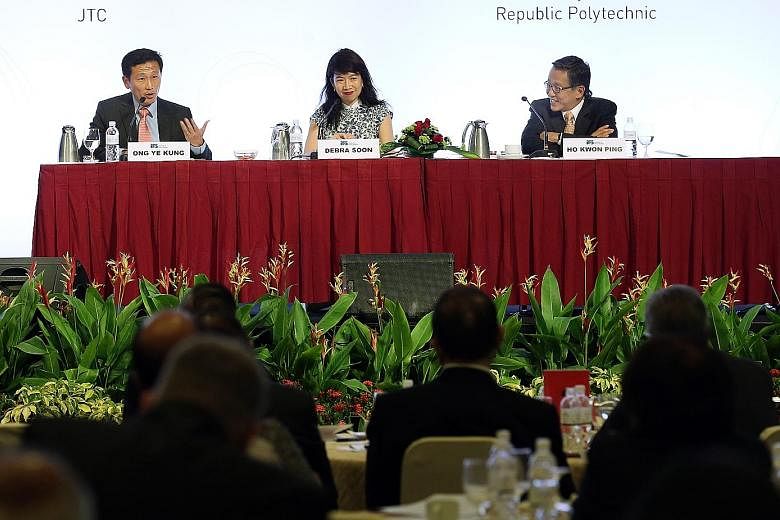A one-party system may give Singapore its best shot at success, because it is a small country that needs to stay nimble, said Education Minister (Higher Education and Skills) Ong Ye Kung yesterday at the Institute of Policy Studies' annual Singapore Perspectives conference.
But Banyan Tree executive chairman Ho Kwon Ping, who spoke on the same topic, warned that one-party systems face the danger of its political elites becoming slow to change, resulting in a culture of entitlement and corruption.
He added that the most desirable scenario for Singapore would be a system of robust internal competition within the People's Action Party (PAP).
Likewise, Mr Ong stressed that the PAP must stay open-minded and grounded in reality, and have integrity beyond reproach.
Both men were on a panel discussing whether rule by a single political party is best for Singapore.
The panel also addressed the possibility of Singapore having a two- or multi-party system.
In his speech, Mr Ong made the case that single-party rule is the best way for a small country like Singapore to succeed.
He said the party need not be the PAP, but whichever party is the most capable.
For a multi-party system to form, said Mr Ong, there must first be at least two sufficiently different paths for Singapore to take, and political views distinct enough for different parties to uphold.
But Singapore is not big enough to have geographically separate towns which evolve drastically different views on national issues, he said.
Another reason he cited is that Singapore needs to stay nimble and move fast in a changing global environment. Mr Ong questioned whether it could do so with a multi-party system.
He said: "A country's success is always idiosyncratic and can never be replicated wholesale by another.
"The formula for success is based on different political processes and ours happens to be a one-party system," said Mr Ong, who was recently made an organising secretary of the PAP and has been touted as a possible future prime minister.
He added that complacency, elitism and corruption are not inevitable outcomes of single-party rule, and these traits have shown up across all political systems.
However, Mr Ho said history shows that a ruling political party which faces no competition tends to turn complacent.
Citing the declines of India's Indian National Congress and the Kuomintang in Taiwan, Mr Ho said a founding party's political values can be passed down over three or four generations of leaders.
Beyond that, complacency will overwhelm the self-discipline instilled by the party's pioneers and its political culture will erode, he told the 960 policymakers, businessmen and students in the audience.
Nevertheless, Mr Ho thought the PAP had the best chance of any long-term party to set a new record for staying in power, because of its "ability to self-correct and obsessively talk about problems" and find solutions to them.
He suggested that the party introduce a formal way for competing policies to be aired internally.
To this suggestion, Mr Ong said the PAP needed to be as pluralistic a party as possible and must take in people with different views.
"This will lead to internal competition which will be a good thing.
"Today it exists, there are diverse views, the public doesn't see them, but perhaps we ought to formalise this over time," he said.
But Mr Ho said internal party competition by itself cannot ensure political elites remain relevant.
Civil society should also be nurtured and information should be shared more freely, so that the public can have robust discussions on policies, he said.
Ambassador-at-large Tommy Koh, who was in the audience, asked if the PAP could buck the trend of history, or whether it might falter within the next 10 years.
Mr Ho thought the party was unlikely to decline with Prime Minister Lee Hsien Loong around, even if he is no longer Prime Minister but is Minister Mentor or Emeritus Senior Minister.
"So long as he is around, the party's adherence to its core values will remain," said Mr Ho.
Mr Ong - whom Prof Koh called a "credible and leading candidate to be our next prime minister" while asking his question - also said the new leadership team will face a severe test in the next few years.
Describing their challenge, Mr Ong said: "How do we then ensure we have the bond with the rest of the party members to continue to hold everything together, while ensuring the PAP is as pluralistic and diverse as possible?"


